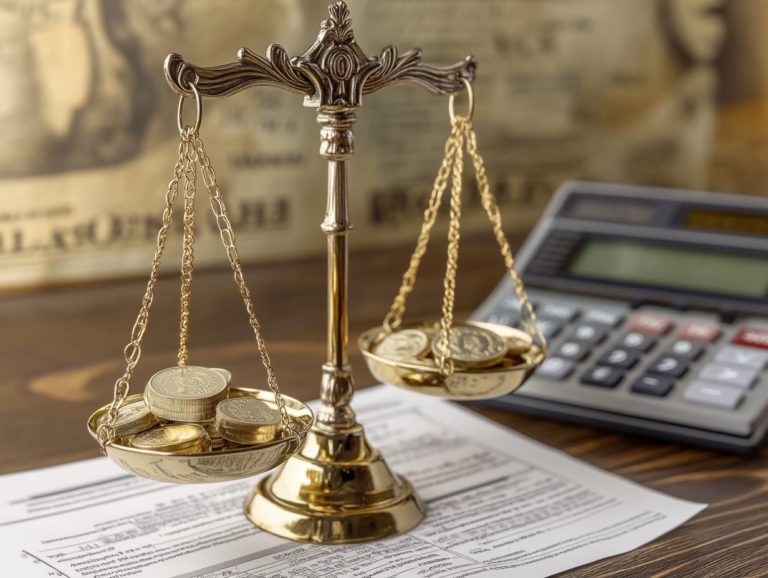The Importance of Tax Compliance for Precious Metals Investors
Investing in precious metals is thrilling, but understanding tax compliance is vital to protect your hard-earned money!
Tax compliance encompasses the regulations established by the IRS governing the buying, selling, and reporting of valuable assets like gold and silver. This article provides a comprehensive overview of tax compliance, its importance for precious metals investors, and the specific tax implications you might face.
You ll delve into capital gains tax, which is the tax you pay on the profit when you sell an asset for more than you paid for it, reporting requirements, and effective strategies to maintain compliance. We will also discuss the potential consequences of non-compliance, including hefty fines and legal troubles. Arm yourself with the knowledge necessary to navigate the complexities of tax obligations in this unique market.
Contents
- Key Takeaways:
- Understanding Tax Compliance for Precious Metals Investors
- Tax Implications of Investing in Precious Metals
- Strategies for Tax Compliance
- Consequences of Non-Compliance
- Frequently Asked Questions
- What is tax compliance and why is it important for precious metals investors?
- Do I have to pay taxes on my precious metals investments?
- What are the potential consequences of not being tax compliant as a precious metals investor?
- Are there any tax laws or regulations specific to precious metals investments?
- How can I ensure that I am tax compliant as a precious metals investor?
- What are some potential benefits of being tax compliant as a precious metals investor?
Key Takeaways:
- Complying with tax regulations helps you avoid fines and legal issues.
- Be aware of capital gains tax and reporting requirements.
- Keep accurate records and seek advice from a tax expert.
Understanding Tax Compliance for Precious Metals Investors
Understanding tax compliance is essential for precious metals investors. It directly influences your wealth preservation strategies and overall investment returns, shaping the way you handle tax implications and liabilities.
Tax compliance is not just about ticking boxes; it s about understanding the detailed tax laws and implications that can impact your investment portfolio significantly.
By adhering to proper reporting requirements and staying informed about your financial obligations, you can effectively navigate the complexities of tax policies. This expertise not only helps you avoid potential legal pitfalls but also ensures a more seamless investment experience.
What is Tax Compliance?
Tax compliance is all about adhering to the tax laws and regulations set by governing bodies, primarily the IRS, ensuring that you fulfill your tax obligations accurately and on time. This process requires a clear understanding of the specific implications tied to various investment categories.
For example, if you’re trading in precious metals, you’ll need to follow unique reporting requirements, such as disclosing sales of gold, silver, and other bullion, which may trigger capital gains taxes. Understanding the importance of tax planning for precious metals investors can help you navigate these challenges. Failing to comply with these regulations can lead to serious repercussions, including hefty fines, penalties, and the looming threat of IRS audits.
Maintaining tax compliance is not just a matter of legal obligation; it s a crucial part of financial responsibility that protects you from potential legal troubles and ensures you contribute your fair share to public resources.
Why is it Important for Precious Metals Investors?
For precious metals investors like yourself, grasping the nuances of tax compliance is essential. It enhances the efficiency of your investment management while revealing opportunities to optimize tax advantages.
By staying well-informed about regulations surrounding capital gains and pertinent reporting requirements, you can strategically position your portfolio to minimize potential tax burdens. A solid understanding of tax-related decisions can significantly enhance your long-term financial planning, giving you the power to make informed choices about which metals to acquire or sell.
This knowledge equips you to navigate the complexities of your investments with both confidence and foresight, ultimately fostering sustained wealth growth.
Tax Implications of Investing in Precious Metals
Investing in precious metals like gold and silver comes with noteworthy tax implications that you need to grasp fully. Understanding capital gains tax is crucial, as it can significantly influence your overall tax liabilities and the returns on your investments.
Stay informed and consult a tax professional to navigate your investment journey confidently!
Capital Gains Tax
Capital gains tax is crucial for precious metals investors. It distinguishes between long-term and short-term gains, affecting your IRS obligations based on how long you’ve held the asset.
If you hold your precious metals for more than a year, you could enjoy a significantly lower tax rate, often ranging from 0% to 20%, depending on your income bracket. On the flip side, if you sell your metals within a year, you’re looking at short-term capital gains taxes, which are taxed as ordinary income. This may lead to a much larger tax bill.
Such a distinction calls for some planning ahead, especially if you’re keen on minimizing your tax burden.
Consider selling losing investments to lower your taxes. This is known as tax-loss harvesting. By selling underperforming assets in the same tax year, you create a buffer against taxation while optimizing your overall investment portfolio.
Reporting Requirements
Understanding the reporting requirements for your precious metals investments is crucial for staying compliant with IRS regulations. Don’t ignore your reporting requirements; staying compliant will save you from hefty fines!
You need to be aware of the various forms you must file, such as Form 1099-B for any transactions involving the sale of precious metals. Keeping meticulous records of all your purchases, sales, and appraisals provides you with a safety net in case of an audit. The IRS isn’t playing around; neglecting these reporting standards can lead to hefty fines or even criminal charges. Additionally, understanding the role of precious metals in tax-advantaged accounts can further help you navigate these complexities.
By being diligent about your record-keeping, you can ensure a smoother process and enjoy peace of mind, allowing you to focus on your investment strategies without the looming threat of compliance issues.
Strategies for Tax Compliance
Implementing effective tax compliance strategies is crucial for you as an investor in precious metals. This approach not only ensures that you adhere to tax policies but also helps you maximize potential tax benefits while minimizing your tax liabilities.
Keeping Accurate Records
Keeping accurate records is essential for ensuring your tax compliance. It provides the necessary documentation to meet IRS reporting obligations related to your precious metals investments.
Thorough record-keeping can be your secret weapon for successful investing! By systematically organizing transaction receipts, invoices, and appraisals, you protect your assets and create a comprehensive overview that aids in your strategic decision-making.
Best practices recommend using specialized software or spreadsheets to categorize your purchases, sales, and market price fluctuations, ensuring that every detail is easily accessible. Maintaining an organized record will also streamline the process during audits or financial reviews, ultimately enhancing your credibility and boosting your confidence in your precious metals portfolio.
Working with a Tax Professional
Working with a tax professional is a wise move for anyone investing in precious metals. They can offer personalized advice tailored to your unique portfolio and tax compliance needs.
By tapping into their expertise, you can skillfully navigate the often complex and ever-changing tax regulations that govern transactions in the precious metals market. These professionals delve into the intricacies of tax codes, ensuring you stay compliant while optimizing the deductions and credits available to you. To better understand the current landscape, especially in 2024, consider reviewing the tax landscape for precious metals. A tax expert can also streamline your reporting process, minimizing the risk of errors that could lead to audits or penalties.
Working with a tax professional not only enhances your financial peace of mind but also has the potential to boost your overall returns through strategic tax planning especially crucial in such a volatile market.
Consequences of Non-Compliance
The repercussions of failing to comply with tax laws can be quite severe for precious metals investors. You face risks such as substantial fines, legal ramifications, and even the possibility of tax evasion allegations, which could result in significant financial obligations.
Fines and Penalties
Fines and penalties for tax non-compliance can vary widely based on the severity of your violation and the IRS’s assessment of the money you owe.
If you neglect to file a required tax return, you may face a penalty of 5% of the unpaid tax for each month it remains outstanding, capping at a maximum of 25%.
In more serious scenarios, such as intentionally not paying taxes or fraud, the stakes rise dramatically. This could potentially lead to criminal charges, substantial fines, and even imprisonment.
Stay informed! Your financial future depends on understanding tax laws and regulations, as any changes can directly affect your financial responsibilities.
Understanding the complexities surrounding tax compliance helps you steer clear of penalties. It also fosters a sense of financial integrity and peace of mind for everyone involved.
Legal Ramifications
Legal ramifications stemming from tax non-compliance could lead to serious consequences, including criminal charges for tax evasion.
These issues can have a profound effect on your financial stability and reputation.
Neglecting to follow tax regulations may result in hefty fines. It could also expose you to potential imprisonment, damaging your credibility within the investment community.
Such legal troubles can deter future partners and lenders from wanting to work with you, significantly limiting your opportunities for growth and expansion.
You might find yourself under increased scrutiny from regulatory bodies, complicating future transactions or ventures.
It’s crucial to understand that maintaining compliance protects you from severe repercussions. It also cultivates a trustworthy image, an essential element for successful long-term investment relationships. For those involved in precious metals, understanding tax brackets is particularly important.
Frequently Asked Questions
What is tax compliance and why is it important for precious metals investors?
Tax compliance refers to following all applicable tax laws and regulations when conducting financial transactions. It is important for precious metals investors because failure to comply can result in penalties, fines, and legal consequences.
Do I have to pay taxes on my precious metals investments?
Yes, in most cases, you will be required to pay taxes on your precious metals investments. This can include capital gains tax, sales tax, and other applicable taxes depending on your country and the type of investment.
What are the potential consequences of not being tax compliant as a precious metals investor?
Some potential consequences include fines, penalties, and legal ramifications such as audits or even criminal charges. It can also negatively impact your overall financial health and reputation.
Are there any tax laws or regulations specific to precious metals investments?
Yes, different countries have specific tax laws for precious metals. Research these laws before making any investments.
How can I ensure that I am tax compliant as a precious metals investor?
The best way to ensure tax compliance is to educate yourself about the applicable tax laws and regulations. You should also seek advice from a tax professional or financial advisor to navigate complex tax issues related to your investments.
What are some potential benefits of being tax compliant as a precious metals investor?
Aside from avoiding penalties, being tax compliant helps maintain a good reputation and build trust with other investors and financial institutions. It can also lead to opportunities for tax deductions and exemptions, ultimately saving you money in the long run.
Take action today! Consult a tax expert to safeguard your investments.














